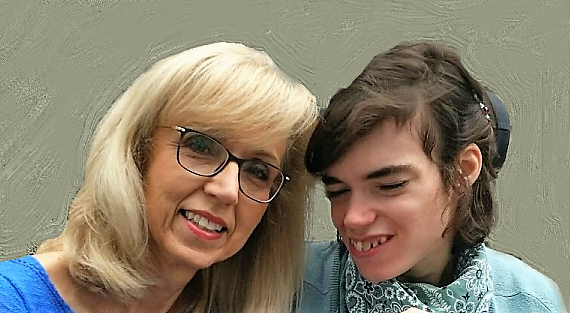 This morning, the sun rose on a beautiful September day – intense blue skies, crisp air, birds singing their last few songs before heading south. Trying to start the day on a calmer and more positive note than the day before, I took my early morning cup of tea and a blanket and curled up on my favorite chair on the porch. Lifting my face to the warm sun, I closed my eyes and took a deep breath of the cool, fresh air......and smelled the lingering and noxious fumes of the paint I’d used on the metal basement door twenty feet away, my last chore of the busy day before. No matter how beautiful the day appeared, there was no escaping the ever present unavoidable reality of that odor. Somehow, it all seemed like a metaphor for my life these days. I can’t escape the fact that underneath the calm of any particular moment lurks the very real evidence that all is not well. Whereas I can be assured that those smelly Rustoleum fumes will fade away, that kind of assurance only applies to things like paint odor, head colds, and traffic jams. I am all too aware that there is no assurance that things will get better in one of the most terrifying things in my life, the worsening of the crisis in the DSP workforce, those hard-working, caring people without which my daughter cannot survive. Yesterday was a demanding and depressing day. I spent most of three hours participating on the phone in meetings on the DSP Workforce Crisis. I couldn’t attend in person because I was providing care to both my husband and daughter at the same time as these meetings. (Read Sandwiched: Caring for an Adult with Developmental Disabilities and an Aging Spouse) These meetings are too important to miss, so I conferenced in so that I could listen and interact with professionals, advocates, parents, and DSPs trying to find a way to deal with this worsening crisis, and our inability to engage policymakers and purse-string holders in understanding the problems in the DSP workforce. The DSP workforce is as vital to most individuals with developmental disabilities as oxygen. Despite rhetoric about choice and control, individual rights and inclusive, community-based supports, the quality of support is decreasing; the instability of supports is increasing. How can it not? Staffing ratios are down, turnover is high, vacancies can’t be filled, DSPs are working multiple shifts and multiple jobs. All of this is occurring in systems overburdened with rules and regulations and underfunded in general. Parents with children in provider care note incidents occurring because the revolving door of DSPs doesn’t know their child’s needs or are unfamiliar with behaviors. Parents whose children are self-directing can’t find DSPs. Parents don’t know if their child will have care from one day to the next. They’re quitting jobs and incurring financial hardships in order to care for adult children. Aging parents have no choice but to bring adult children home for weekends from group homes and supported apartments because the provider can’t provide staffing. There are reports of individuals going missing and perishing not because of their own challenges but because of inadequate staffing. Increasingly complex systems requirements mean that DSPs in already understaffed supports are spending too much time on paperwork and not providing necessary supports and oversight. Providers struggle with overtime and the costs of turnover. These things are happening today while we are still here to advocate for our children, help them deal with issues, provide their care, but we are getting older, and we are struggling now.....who will provide stable, adequate care tomorrow?.....I don’t mean our future tomorrows, I mean the next morning that the sun rises in the lives of our children. It seems like I’ve been moaning and complaining about this issue forever. I’m even tired of listening to myself. But the problem is so excruciatingly important, so desperately real that its looming presence lurks evilly through every minute of every day. I find myself launching into soliloquies in front of total strangers searching for just the right words to adequately and succinctly represent how important this issue is, the impact it has on individuals, on families, on providers who strive to create quality supports despite many roadblocks. I’m worried that people aren’t really listening......especially those that can make a difference. We’ve said it all before; they’ve heard it all before. Are our words becoming like static, white noise, to which they no longer pay attention? I want to scream, but nothing has changed! nothing is getting better! In the last five years—since we started seriously advocating on this issue—we have had some funding increases for DSPs. What amounts to about a dollar an hour total increase in DSP pay rates is helpful, but leaves pay rates still far less than commensurate with the skill and responsibility required for the job, and has been insufficient to affect vacancy and turnover rates. At the same time the cost of living has increased, rising about five percent in the last few years with the biggest jump in 2018 of 2.8 percent, shrinking the value of that dollar increase. And the minimum wage in New Jersey will have increased by over two dollars an hour by January 1, bringing it ever closer to the average pay rate of a DSP in New Jersey. A Direct Support Professional does not do minimum wage work. This crisis is costing lives, it is endangering well being, it is impacting the ability of individuals with developmental disabilities to live lives of value and dignity and it is robbing parents of any hope that their children can live acceptable lives after they’re gone. It is also depleting the historically underfunded resources available for supports for individuals with developmental disabilities. The President’s Committee for People with Intellectual Disabilities estimated in 2018 that there were 1,276,000 DSPs in this country. They estimate that is costs $4,073 to replace a DSP. With turnover rates at about 45% that means that 574,200 DSPs had to be replaced in 2018 at a cost of $2,338,716,600. Increasing pay rates is the critical first step in addressing the DSP workforce crisis—a reasonable pay rate will attract workers and offer them more than the near poverty level wages they receive now. DSPs are simply not being recognized for the valuable, difficult, interdisciplinary work that they do and the skill and training that it requires. In order for DSPs to be valued, the developmentally disabled population has to matter......to more than their families and the people who work in the DD community. The DD population is the most underrepresented, undervalued, under respected segment of our population. Is it any wonder that the people who provide critical supports for them are undervalued as well? Before this day is through, I have to put a second coat of paint on that door.....which means those paint fumes will linger into tomorrow and what is supposed to be another beautiful morning in this string of beautiful fall days we’re having. I think I’ll find another spot to drink my tea. I don’t need a reminder that a new day has dawned and all is definitely not well.
0 Comments
|
Gail Frizzellis the author of Special Needs: A Daughter's Disability, A Mother's Mission. Gail is an accomplished advocate and writer in the field of developmental disabilities and Mom to Lauren, a young woman endeavoring to lead her best life despite severe challenges. Archives
September 2019
Categories |

 RSS Feed
RSS Feed